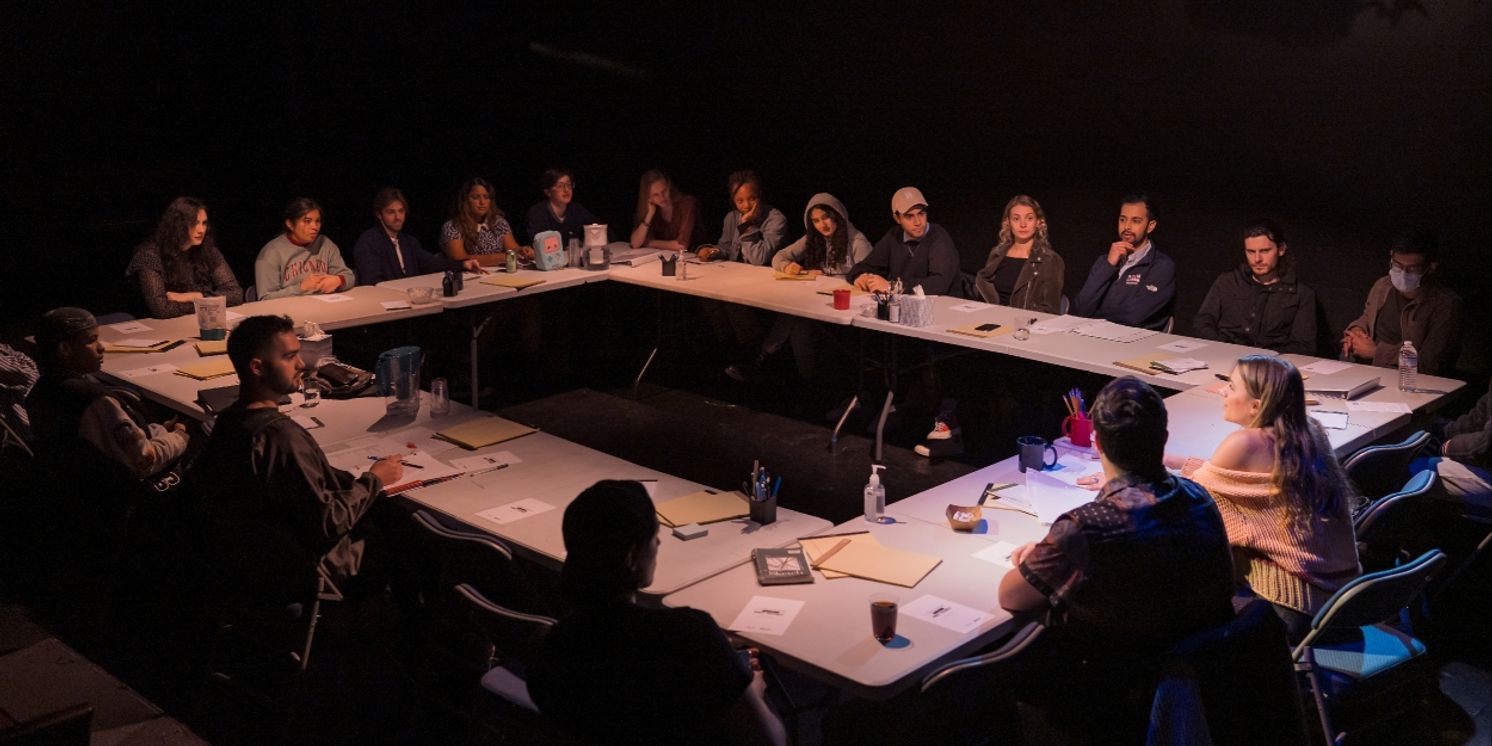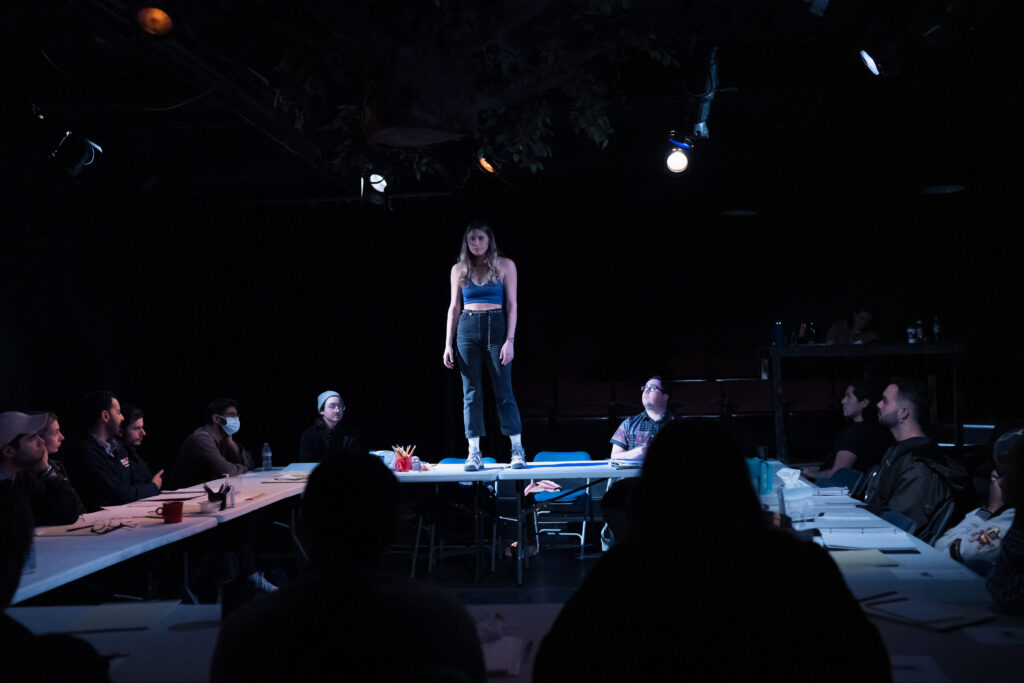Review: A PUBLIC READING OF AN UNPRODUCED SCREENPLAY ABOUT THE DEATH OF WALT DISNEY at Zephyr Theatre
An E-Ticket Dark Ride Into The Soul Of Walt Disney

The title of Lucas Hnath's 2013 play is unwieldy. In fact, if it weren't in italics, we weren't sure whether it was a play title or a press release description. A Public Reading of an Unproduced Screenplay About the Death of Walt Disney succinctly describes the premise, but once we got past the revelation that this was the actual title of the play, we had an idea what to expect, especially after entering the Zephyr Theatre, one of a myriad of tiny black boxes in Hollywood, located on Melrose Avenue. The play completed a limited, two-weekend run on January 28.
Staged as an immersive production, audience members are seated before eight resin folding tables formed in a square upon which have been placed the trappings of a script reading session: coffee mugs stuffed with pens and pencils, lip balm, dispensers of Purell, tissue boxes, yellow pads, and assorted mints and snacks. With no stage, the expectation was that the four cast members listed in the program would be seated along with the audience at the reading tables and it became a game trying to figure out who they were. I suspected that one was sitting next to me: a young man wearing a letterman's jacket, a kerchief wrapped around his head, with a looseleaf binder on the table in front of him and chatting amiably with the guest to his right.
Everleigh Brenner as Walt Disney
When the doors to the theatre were closed, a young woman enters and sits at the far table. She introduces herself. "I'm Walt Disney. This is a screenplay I wrote. It's about me." Mixed gender casting is nothing new in Hollywood, and although one expects the actor playing Disney to be the kindly 65-year-old mogul familiar to his fans, the appearance of an attractive young woman in a halter top proclaiming herself as Disney is a little unnerving. That is until Everleigh Brenner begins her performance. Brenner is astonishingly good in the part and as the play progresses, we instantly forget the incongruity of the casting. Hnath's Disney is the Walt the public was never supposed to see: a megalomaniac dying of lung cancer who wants to retain control of his empire and his legacy at all costs. Brenner proceeds to read stage directions from the script, which flow seamlessly without vocal inflection, as if it's a first read by the cast. It becomes a relentless, rhythmic, almost musical patter that takes on its own momentum after one of the "guests" sitting at the tables turns out to be Disney's older brother Roy (played by Sasan Ahmed, disguised wearing a Biden-Harris Team jacket). Walt and Roy finish each other's sentences, punctuated by Walt reading stage directions, with Walt interrupting by repeatedly snapping "cut to" when he hears something he'd rather not hear.
Daniel Stonewall rises from the audience to portray Disney son-in-law Ron Miller. Everleigh Brenner is on the far left.
The suspected cast member sitting next to me turned out to be Daniel Stonewall, who plays Ron Miller, Disney's oafish son-in-law, a former professional football player groomed by Disney to become a producer. Shortly after, Maya Valenciano emerges from another table, revealing herself as Disney's unnamed daughter (actually Diane Disney), Miller's wife, who is resentful of her father's cruel and manipulative personality. Stonewall, Valenciano, and Ahmed are all excellent, but this is Brenner's showcase and her shattering performance as Disney is remarkable.
Walt and Roy begin arguing about current projects Walt is working on: nature documentaries, including one about lemmings and a utopian city Walt is planning to build in Florida. His dreamed-of city (which would become EPCOT, whose acronym stands for Experimental Prototype Community of Tomorrow) is designated to be a place "where people can live forever." Walt rails against attempts by Disney employees to unionize, something that actually occurred in 1941, and begins expressing interest in cryonics, the low-temperature freezing of human remains. When he starts coughing up blood into tissues, we realize he recognizes he is dying and that his intentions are to live forever and we begin to understand his desperation and mountainous ego. "You don't live well with people," his daughter tells him. "You're like a god."
As Disney, Brenner berates the other three family members, gulping pills, swigging from a whiskey bottle, swearing incessantly, and behaving totally unlike the avuncular image he has cultivated since becoming the wünderkind of the movie industry in the 1920s. The play is unnerving and cynical, but totally engrossing thanks to Brenner's superlative performance. When Walt boasts about famous personalities saying nice things about him, including President Franklin Roosevelt, scientist Werner von Braun, and actress Doris Day, we start to get an idea of his monstrous ego. Then when he starts praising the likes of Italian fascist dictator Benito Mussolini, who had said Snow White & the Seven Dwarfs was his favorite film, we cannot help but think of Donald Trump's own raging narcissism, and Disney's monstrous agenda becomes apparent. In fact, his sense of self-importance is so out of control that he sees the world not surviving his impending death.
Despite the morose and cynical tone of the play, Hnath injects dark humor throughout the script. Disney has become a cartoon character unto itself, as Hnath takes the worst elements of the various tell-all confessionals about Disney's life and explodes them, mixing fact with speculation in creating a Frankensteinian mad scientist who has let unmitigated success go to his head. The effect is both disturbing and hilarious at the same time.
Eveleigh Brenner in the play's shattering final scene
Producer Sidne Phillips and director Brian Eckert effectively use immersive staging to bring the audience into the boardroom. We are aghast, just as are Roy, Ron, and Diane, at Disney's unraveling before our eyes. Some audience members appear petrified that he might target them too, and the effect is as disconcerting as it is entertaining and thought provoking. The play makes us think about how the public Disney persona masked an authoritarian dark side that actually existed to some degree, although not necessarily in the raging fashion portrayed by Hnath in his play. But certainly the next time people who see this play venture again into "The Happiest Place on Earth," they might ponder about how its atmosphere of magic and fantasy was merely a facade for a darker side to the multiple layers of Disney's personality, which represents what happens when overwhelming success is threatened by mortality.
Reader Reviews
Videos




